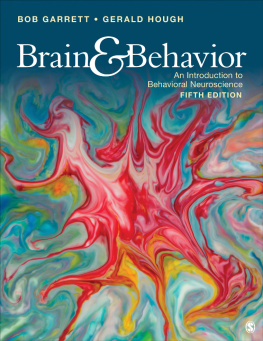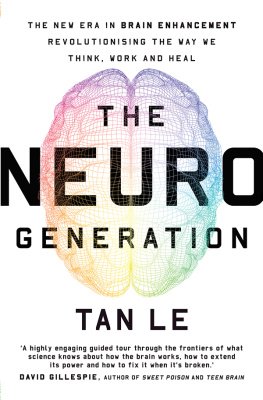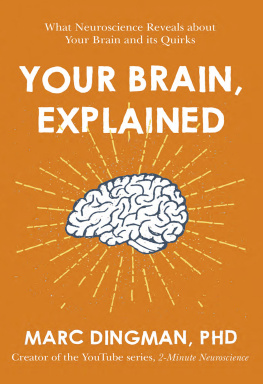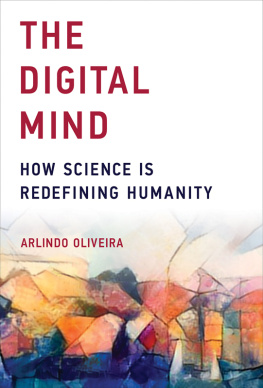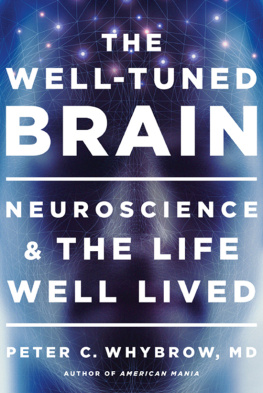
Contents
ENLIGHTENED EXPERIMENTS:
INVENTING THE MARKET SOCIETY
For Nancy
Why is it, do you suppose, that an Englishman is unhappy until he has explained America?
E. B. White (1971)
The supreme test of all political institutions and industrial
arrangements shall be the contribution they make to the
all-around growth of every member of society.
John Dewey (1920)
I FIRST BEGAN THINKING about the ideas that were to become The Well-Tuned Brain in 2008, in the wake of Americas ruptured housing bubble and the worldwide financial seizure that it provoked. American Mania had been published a couple of years earlier and essentially predicted such a meltdown. But why, I asked myself, had the madness become so pervasive in Western culture? What were we thinking? Looking back, it defies common sense to believe that any economic system, but particularly a globalized market system, could indefinitely sustain itself on debt and speculation.
Amid the wreckage of subprime mortgages, easy money, and shifting weather patterns, I was not alone in my rumination. As the workaday treadmill slowed, and the collective anxiety mounted across Europe and in the United States, the mood was one of angry, confused reflection. In the public forum, perhaps in fright, perhaps in hope, we thrashed about searching for villains and plausible causes. And rogues there were, with the bankers being high on most lists, but self -reflection and discussions around the part we each may have played in the economic debacle were remarkably muted. In the main we preferred to find explanation out there, apart from our personal behavior and our responsibilities as informed citizens.
This intrigued me. The foibles of humankind are no secret but are written large in the history of our species. Nor are our assets obscure when it comes to thinking about who we are. One of the amazing things about modern times is that we have made great strides in understanding the biology of the brain and its role in shaping human culture. And yet when thinking about our social and political organization, we tend to ignore such insights, especially in commanding our own behavior. The Well-Tuned Brain is my effort to highlight how knowledge of science can improve self-understanding and how such insights can serve all of us, and the common good, going forward. But that is only one part of my agenda. As intensely social creatures, we have many qualities, some that we are in danger of forgetting, which are essential to living together constructively in the frenetic, information-saturated world that we have created for ourselves. My effort is to bring these diverse elements together, integrating history, psychology and neuroscience with sociocultural insight and economic commentary, to craft a cohesive story upon which to build a balanced future vision.
I am fully aware that this is an ambitious undertaking. As such, I temper my ambition with humility. We still have much to learn about human behavior, and inevitably my analysis falls short. But I have learned over the years that it is easier to criticize than to constructto look back rather than forward. Hence, while I take full responsibility in attempting this synthesis, I make no apology.
Woodstock, Oxfordshire,
September 2014
The Well-Tuned Brain
In The Age of Man :
Progress and Its Pursuit
... progress, mans distinctive mark alone,
Not Gods, and not the beasts.
Robert Browning, A Death in the Desert (1864)
WE ARE LIVING in the shadow of our achievements.
Our compelling, technology-rich, supercharged world is one born of explosive economic growth. While over the past half-century the planets human population has increased, more than doubling since 1950, the global economic output over the same period has multiplied nearly eightfold. In the developed Western nations this unprecedented expansion has led to a massive increase in material goods and in market choicea shift particularly evident in the consumer society of the United States, the nation that for over a century has been the worlds commercial and economic leader.
This invention of the modern world owes much to capital markets and to the spirit of the European Enlightenment, of which America has become the Grand Experiment. The material affluence we now enjoy validates the Enlightenment principle of individual freedom and the conviction that scientific and technical advance is best achieved by harnessing human reason within a competitive marketplace. This grand reimagining of the human condition, one where we strive to control our place in nature and maximize economic growth as the source of personal well-being, we now describe as progress.
Since the last ice age, some ten thousand years ago, the Earths climate has been peculiarly stablea period that geologists call the Holoceneand that constancy has aided the human ascendancy to planetary dominance. However, over the past two or three centuriesindeed since the Enlightenmentwe have witnessed a cultural revolution that has been a faster and more profound driver of that dominance than anything in history. Catalyzed by an insatiable curiosity and served by a superior intelligence, we have contrived ways to unleash the power of fossil fuels, temporarily breaking free from the living worlds organic-based energy cycle and harvesting to our advantage the Earths great natural resources.
In this energy-rich modern age health and wealth have never been so abundant: we live longer; the vast majority of our offspring survive childhood; we are largely literate, and in the developed economies many individuals enjoy material comforts that for centuries were beyond the reach of kings. That is not all: as economic growth continues to quicken and material poverty declines, it is the American contemporary ideal of material progress that shapes expectations for China, India, and the rest of the emerging world. As John Stutz of the Tellus Institute has described it, We are a global consumer society poised on the brink of affluence.
Or perhaps we are courting disaster? We are discovering, in this headlong pursuit, that our material progress has unintended consequences, both personal and environmental. In less than a century we have wrought changes in the Earths geology and biosphere on a massive scale. It is a dubious testimony to our zeal that the stigmata of some of our most ambitious projects are now easily detectable from an orbiting satellite two hundred miles above the Earths surfacethe disappearing Aral Sea and the vast excavation of the Athabasca tar sands in northern Alberta being but two examples. And then in addition, given our addiction to fossil fuels there is mounting evidencenow reinforced by superstorms such as Katrina and Sandythat human appetites play a significant role in climate change.
In a globalized commercial world, human intervention is suddenly everywhere, monopolizing the ecosystem for our singular benefit and significantly disturbing its balance. Todays world is fundamentally differenta new planet Eaarth, as Bill McKibben has described itfrom the ancestral environment that nurtured the human species. The distinguished biologist E. O. Wilson has calculated that with seven billion of us now living on this planet, the human biomass that the Earth must sustain is roughly one hundred times greater than the biomass of any previous large animal species. Indeed, some scientists suggest that we can no longer study the natural world in isolation from human action. They arguefollowing the lead of the Nobel Prizewinning chemist Paul Crutzenthat we have entered a new geological epoch that is better described as the Anthropocene: this is The Age of Man .
Next page


